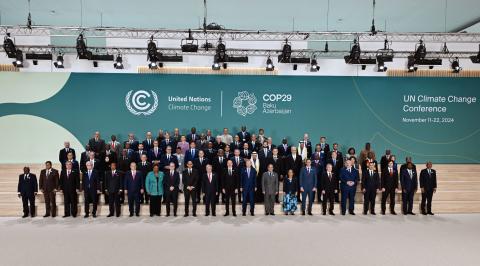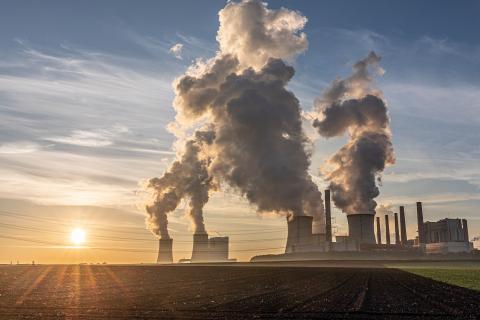Fossil CO2 emissions to rise to 37.4 billion tonnes by 2024, says major carbon balance report
There are still no clear signs that global fossil carbon dioxide (CO2) emissions have peaked, according to the 2024 Global Carbon Budget. The report - which is published in the journal Earth System Science Data in preprint format and will be launched at COP29 in Baku - estimates that these emissions will grow by 0.8% this year compared to 2023, to 37.4 billion tonnes of CO2. If this rate continues, there is a 50% chance that global warming will exceed the 1.5°C limit in six years.

Vanesa Castán - Global Carbon Budget 2024 EN
Vanesa Castán Broto
Professor of Urban Climate Change at the University of Sheffield
The Global Carbon Budget points to natural gas as one of the main drivers of carbon emissions globally. Currently, natural gas emissions worldwide are growing faster than coal and oil. Since 22% of global emissions correspond to natural gas, this should be one of the main points of concern to achieve net-zero futures. The rates of increase in natural gas-related carbon emissions are particularly steep in China and India. For years, the fossil fuel industries have presented natural gas as the ‘cleaner cousin’ of oil and coal, arguing that natural gas plays an important role as a ‘transition fuel’ because its combustion is more efficient. This data suggests the opposite is true: natural gas is cementing our dependence on fossil fuels at a time when there should be a swift change to renewable energy. Natural gas therefore drives carbon emissions up and does not work as a transition fuel.
The Global Carbon Budget demonstrates the enormous progress being made towards decarbonisation, with some countries having been successful in slowing down carbon emissions through the national programmes they committed to after the 2015 Paris Agreement for Climate Action (known as Nationally Determined Contributions). However, more is needed to achieve the carbon emission reductions that would put us on a safe path towards net-zero futures. Part of the problem is that much emphasis goes on technological and managerial solutions. Still, there is a need for a profound social transformation that must be promoted through demand management measures, especially in sectors like air travel. Unfortunately, such demand management measures are not yet politically palatable. In short, technology alone is not sufficient; demand management measures are also needed.
The Global Carbon Budget offers a positive story demonstrating the penetration of low-carbon technologies. Many countries offer positive stories of decarbonisation associated with increasingly available renewable generation technologies. However, emissions from fossil fuels continue to increase in non-OECD countries. In many countries with significant deficits in energy access, progress towards universal access to energy (one of the pillars of Sustainable Development Goal 7) has been achieved at the expense of exploiting fossil fuel reserves. Despite the availability of technology and practical solutions to advance a low-carbon economy, lower-income countries find that lack of investment and underdeveloped supply chains stop renewable energy development. Community energy projects offer practical solutions to advance the low-carbon economy in undersupplied, remote areas, but communities need help accessing the means to deliver these projects. There is a need to support lower-income countries therefore to leapfrog towards low-carbon economies.
The Global Carbon Budget is a methodologically robust assessment led by Future Earth, which has been leading global assessments of environmental challenges for 30 years.
Ana Hernández - Global Carbon Budget 2024 EN
Ana Hernández
Sustainability Researcher at the Foundation for Climate Research (FIC)
The latest edition of the Global Carbon Budget highlights how extreme weather events and continued CO₂ emissions are accelerating its accumulation in the atmosphere, significantly exacerbating climate change. In 2023, atmospheric CO₂ concentrations increased by 2.79 parts per million, and are projected to increase by another 2.76 parts per million in 2024, equivalent to approximately 21.5 gigatonnes (Gt) of CO₂. These increases exceed the average annual increase observed over the past decade, highlighting the lack of a significant downward trend.
The sustained increase in CO₂ concentrations highlights the impact of the recent El Niño event, which, combined with massive emissions from wildfires in North and South America, has left additional amounts of CO₂ in the atmosphere. By 2024, atmospheric CO₂ concentrations are projected to reach a record average of 422.5 parts per million, 52% above pre-industrial levels.
This represents a worrying setback against global commitments to reduce emissions and achieve net zero by 2050. Furthermore, this persistent and growing accumulation of CO₂ in the atmosphere puts the goal of limiting the increase in global temperature to 1.5°C, 1.7°C, and even 2°C above pre-industrial levels ever further away, representing a crucial challenge for climate change mitigation and the sustainability of the planet.
Taken together, these data reinforce the urgency of intensifying decarbonization efforts across all sectors and adopting more ambitious mitigation measures to avoid irreversible climate impacts that already affect ecological systems, biodiversity and human security worldwide.
María José Sanz - Global Carbon Budget 2024 EN
María José Sanz
Scientific Director of the BC3 Basque Centre for Climate Change
The Global Carbon Budget reveals the latest trends in global carbon emissions and the ramifications for achieving our global climate goals. It has addressed this challenge by focusing comprehensively on the global biogeochemical cycles that govern greenhouse gases, including their natural and human drivers. Its estimates are based on transparent and scientifically sound methodologies. It began publishing its annual assessments regularly in 2006, accompanied by a description of how the estimates are made and the methodological improvements included.
The Global Carbon Project was established in 2001 to help the international scientific community establish a common and agreed knowledge base on the evolution of atmospheric CO2 concentrations and their drivers.
The Global Carbon Budget [one of the Global Carbon Project's reports] is contributed to by more than 100 experts from multiple scientific organisations. It provides us with consistent, quality global information on trends in carbon emissions and sinks, which is key information for determining progress towards the Paris Agreement goals. It is widely recognised as the most comprehensive report of its kind. It is updated annually and published at the COP meetings each year.
This latest edition shows that many countries have succeeded in reducing their fossil CO2 emissions or slowing their growth, with continuing trends towards decarbonisation (i.e. decreasing CO2 emissions per unit of energy) in most countries, as well as globally, where stabilisation is observed. However, there are still no signs of the rapid and deep decline in totalCO2 emissions that is needed to tackle climate change. Total CO2 emissions, although stabilising in the last decade (2014-2023), compared to strong growth of 2% per year over the previous decade, are not on a downward trajectory towards net zero. They have noted the projected increase in emissions due to land-use change in 2024 (0.5 GtCO2 above the 2023 level) that has been driven by emissions from fires in South America and drought conditions associated with temporary El Niño conditions. They have estimated that climatic conditions reduced the terrestrial sink by 27% in the last decade due to warming and reduced precipitation.
Their limitations stem from the existence of and access to good quality empirical data, which the Global Carbon Project itself has helped to foster by increasingly integrating different communities of experts, and the need, in these cases, to derive this information indirectly.
Ana Cristina Franco - Global Carbon Budget 2024 EN
Ana Cristina Franco Novela
Researcher at the Department of Earth Sciences at the Barcelona Supercomputing Center
The Global Carbon Budget is a study that quantifies anthropogenic carbon emissions, as well as the role of the ocean and terrestrial biosphere in reducing or exacerbating the total concentration of carbon in the atmosphere. This study is an international effort of more than eighty research institutions involving hundreds of climate change experts. This year, fossil carbon emissions are reported to be 0.8% higher than last year, with no clear signs of a peak, let alone a negative trend.
The report shows some efforts to combat climate change and highlights the negative trend in emissions from land use change (e.g. less emissions associated with deforestation in the last decade). However, natural fluctuations in carbon sinks, especially in the terrestrial biosphere, may contribute to the increase in atmospheric carbon. For example, in 2024, forest fires and biosphere degradation related to the El Niño event in 2023-2024 are reported to have favoured an increase in total (i.e. anthropogenic and natural) carbon emissions, being 2% higher than in 2023.
The study reports that, if this trend in total emissions continues, in the next six years the global temperature of the planet will exceed the 1.5°C limit set in the Paris Agreement. To avoid exceeding this temperature limit, anthropogenic carbon emissions must be drastically reduced. At present, technologies to deliberately remove carbon dioxide from the atmosphere do not play a relevant role in counteracting anthropogenic carbon emissions.
Conflict of interest: Ana Cristina Franco Novela is a colleague at the BSC of some of the authors of the report, but she has not participated in its elaboration.
Friedlingstein et al.
- Non-peer-reviewed
- Preprint



